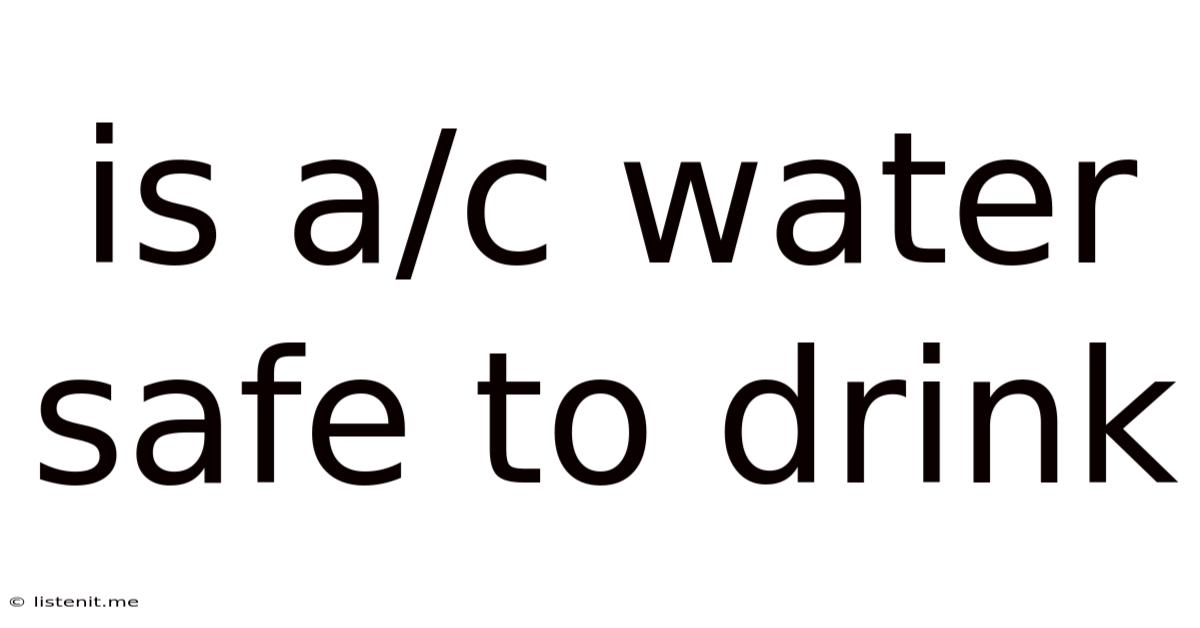Is A/c Water Safe To Drink
listenit
Jun 11, 2025 · 4 min read

Table of Contents
Is AC Water Safe to Drink? A Comprehensive Guide
The sweltering heat of summer often leaves us reaching for the nearest cool drink. But what if, in a moment of desperation, you considered the water condensing in your air conditioning unit? Is AC water safe to drink? The short answer is a resounding no. This article delves deep into the reasons why, exploring the potential dangers and offering safer alternatives for hydration.
The Unseen Dangers Lurking in Your AC Unit
While the idea of utilizing readily available water might seem appealing, especially during an emergency, the reality is that air conditioner condensate water is far from pure. Several factors contribute to its contamination, rendering it unsafe for human consumption:
1. Bacterial Growth: A Breeding Ground for Microorganisms
Air conditioning units, especially those not regularly cleaned and maintained, become breeding grounds for bacteria, fungi, and other microorganisms. The dark, damp environment within the condensate collection pan provides the perfect conditions for these organisms to thrive. These microbes can cause a range of illnesses, from mild gastrointestinal distress to severe infections.
Harmful bacteria found in AC water can include: Legionella, E. coli, and various other pathogens. These can lead to severe respiratory problems, diarrhea, vomiting, and even life-threatening conditions.
2. Dust, Debris, and Airborne Pollutants
AC units draw in air from the surrounding environment. This air inevitably contains dust, pollen, pet dander, and various airborne pollutants. These contaminants get trapped within the unit and eventually end up in the condensate water. Ingesting this contaminated water can lead to respiratory problems, allergies, and other health issues.
3. Chemical Contamination: Refrigerant and Cleaning Agents
Air conditioning units use refrigerants, chemicals crucial for cooling. Although these refrigerants are typically contained within sealed systems, leaks can occur, contaminating the condensate water. Furthermore, the cleaning agents used to maintain the unit can also contaminate the water, potentially containing harsh chemicals harmful to human health.
4. Mold and Mildew: A Silent Threat
The damp environment within the AC unit fosters the growth of mold and mildew. These fungi release spores that can cause allergic reactions, respiratory problems, and other health issues. The spores can easily contaminate the condensate water, further jeopardizing its safety for consumption.
The Myth of Emergency Hydration: Why AC Water is Not a Suitable Solution
In survival situations, the temptation to drink any available water is understandable. However, the risks associated with drinking AC condensate water far outweigh any potential benefits. Dehydration, while serious, is rarely a quick-onset, life-threatening condition. Prioritizing finding a safe water source is always advisable over resorting to potentially contaminated sources like AC water.
Better Alternatives in Emergency Situations:
- Collecting rainwater: If possible, collect rainwater in a clean container. While not sterile, rainwater is generally safer than AC condensate water.
- Finding natural water sources: Look for clean-flowing streams or springs, avoiding stagnant water. Boiling the water before consumption is crucial.
- Using water purification tablets: These tablets can effectively kill harmful bacteria and viruses in water, making it safe to drink.
Maintaining Your AC Unit for Optimal Hygiene: Prevention is Key
While you should never drink AC condensate water, maintaining your unit properly can minimize the risk of contamination and improve overall indoor air quality. Regular cleaning and maintenance are crucial:
- Regular cleaning of the condensate drain pan: This simple step significantly reduces the buildup of bacteria, mold, and other contaminants.
- Professional AC servicing: Schedule annual professional servicing to detect and address any leaks or malfunctions.
- Regular filter replacement: Replacing the air filter regularly prevents dust and other airborne particles from accumulating within the unit.
- Addressing leaks promptly: Promptly address any leaks to prevent water stagnation and microbial growth.
Exploring Safer Alternatives for Hydration: Staying Healthy and Hydrated
Staying properly hydrated is paramount for good health. Instead of resorting to potentially dangerous sources like AC water, here are safer and readily available options:
- Bottled water: A convenient and readily available option, though consider the environmental impact of plastic waste.
- Tap water: If your tap water is safe and palatable, it's a cost-effective and sustainable option.
- Filtered water: Using a water filter can improve the taste and quality of tap water, removing impurities and contaminants.
Conclusion: Prioritize Safety Over Convenience
The temptation to use readily available water sources might be strong, but the potential health risks associated with drinking AC condensate water are too significant to ignore. The water collected from an air conditioning unit is not safe for human consumption and should never be considered as a source of hydration. Prioritize clean and safe water sources to maintain your health and well-being. Remember, prevention through proper AC maintenance and choosing safe alternatives for hydration is always the best approach. Always err on the side of caution when it comes to your health and hydration.
Latest Posts
Latest Posts
-
Nurse To Patient Ratios And Patient Outcomes
Jun 13, 2025
-
Is Phosphate Group Polar Or Nonpolar
Jun 13, 2025
-
A Calorie Is Also Referred To As A
Jun 13, 2025
-
Does Low Dose Naltrexone Affect Serotonin
Jun 13, 2025
-
Why Is It Important To Identify Unknown Bacteria
Jun 13, 2025
Related Post
Thank you for visiting our website which covers about Is A/c Water Safe To Drink . We hope the information provided has been useful to you. Feel free to contact us if you have any questions or need further assistance. See you next time and don't miss to bookmark.